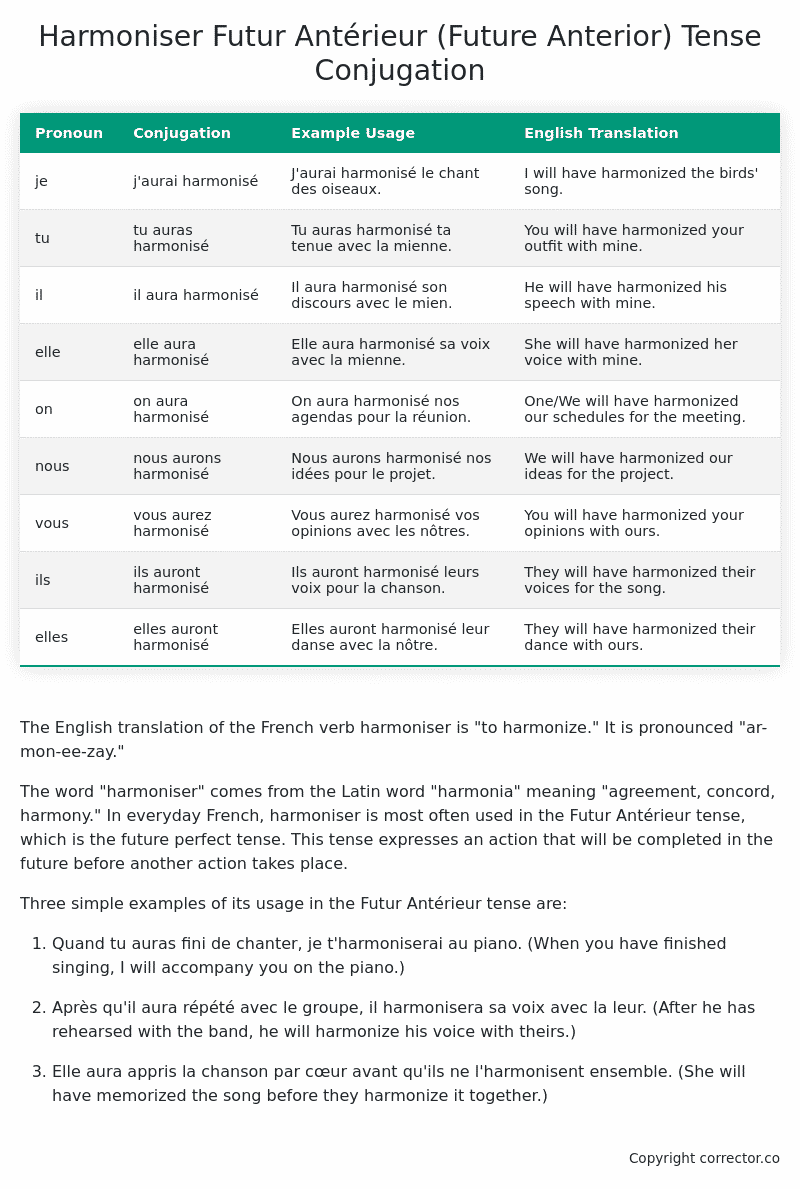Futur Antérieur (Future Anterior) Tense Conjugation of the French Verb harmoniser
Introduction to the verb harmoniser
The English translation of the French verb harmoniser is “to harmonize.” It is pronounced “ar-mon-ee-zay.”
The word “harmoniser” comes from the Latin word “harmonia” meaning “agreement, concord, harmony.” In everyday French, harmoniser is most often used in the Futur Antérieur tense, which is the future perfect tense. This tense expresses an action that will be completed in the future before another action takes place.
Three simple examples of its usage in the Futur Antérieur tense are:
-
Quand tu auras fini de chanter, je t’harmoniserai au piano. (When you have finished singing, I will accompany you on the piano.)
-
Après qu’il aura répété avec le groupe, il harmonisera sa voix avec la leur. (After he has rehearsed with the band, he will harmonize his voice with theirs.)
-
Elle aura appris la chanson par cœur avant qu’ils ne l’harmonisent ensemble. (She will have memorized the song before they harmonize it together.)
Table of the Futur Antérieur (Future Anterior) Tense Conjugation of harmoniser
| Pronoun | Conjugation | Example Usage | English Translation |
|---|---|---|---|
| je | j’aurai harmonisé | J’aurai harmonisé le chant des oiseaux. | I will have harmonized the birds’ song. |
| tu | tu auras harmonisé | Tu auras harmonisé ta tenue avec la mienne. | You will have harmonized your outfit with mine. |
| il | il aura harmonisé | Il aura harmonisé son discours avec le mien. | He will have harmonized his speech with mine. |
| elle | elle aura harmonisé | Elle aura harmonisé sa voix avec la mienne. | She will have harmonized her voice with mine. |
| on | on aura harmonisé | On aura harmonisé nos agendas pour la réunion. | One/We will have harmonized our schedules for the meeting. |
| nous | nous aurons harmonisé | Nous aurons harmonisé nos idées pour le projet. | We will have harmonized our ideas for the project. |
| vous | vous aurez harmonisé | Vous aurez harmonisé vos opinions avec les nôtres. | You will have harmonized your opinions with ours. |
| ils | ils auront harmonisé | Ils auront harmonisé leurs voix pour la chanson. | They will have harmonized their voices for the song. |
| elles | elles auront harmonisé | Elles auront harmonisé leur danse avec la nôtre. | They will have harmonized their dance with ours. |
Other Conjugations for Harmoniser.
Le Present (Present Tense) Conjugation of the French Verb harmoniser
Imparfait (Imperfect) Tense Conjugation of the French Verb harmoniser
Passé Simple (Simple Past) Tense Conjugation of the French Verb harmoniser
Passé Composé (Present Perfect) Tense Conjugation of the French Verb harmoniser
Futur Simple (Simple Future) Tense Conjugation of the French Verb harmoniser
Futur Proche (Near Future) Tense Conjugation of the French Verb harmoniser
Plus-que-parfait (Pluperfect) Tense Conjugation of the French Verb harmoniser
Passé Antérieur (Past Anterior) Tense Conjugation of the French Verb harmoniser
Futur Antérieur (Future Anterior) Tense Conjugation of the French Verb harmoniser (this article)
Subjonctif Présent (Subjunctive Present) Tense Conjugation of the French Verb harmoniser
Subjonctif Passé (Subjunctive Past) Tense Conjugation of the French Verb harmoniser
Subjonctif Imparfait (Subjunctive Imperfect) Tense Conjugation of the French Verb harmoniser
Subjonctif Plus-que-parfait (Subjunctive Pluperfect) Tense Conjugation of the French Verb harmoniser
Conditionnel Présent (Conditional Present) Tense Conjugation of the French Verb harmoniser
Conditionnel Passé (Conditional Past) Tense Conjugation of the French Verb harmoniser
L’impératif Présent (Imperative Present) Tense Conjugation of the French Verb harmoniser
L’infinitif Présent (Infinitive Present) Tense Conjugation of the French Verb harmoniser
Struggling with French verbs or the language in general? Why not use our free French Grammar Checker – no registration required!
Get a FREE Download Study Sheet of this Conjugation 🔥
Simply right click the image below, click “save image” and get your free reference for the harmoniser Futur Antérieur tense conjugation!

Harmoniser – About the French Futur Antérieur (Future Anterior) Tense
Construction
Common Everyday Usage Patterns
Interactions with Other Tenses
For example
Summary
I hope you enjoyed this article on the verb harmoniser. Still in a learning mood? Check out another TOTALLY random French verb conjugation!


